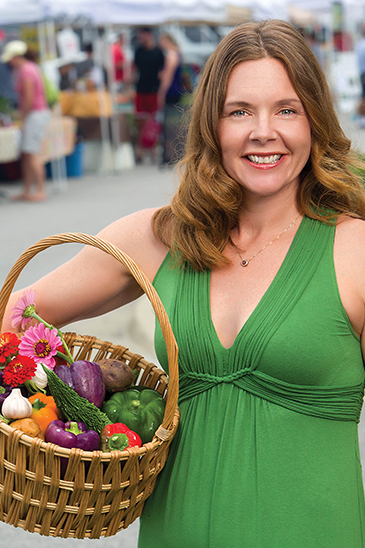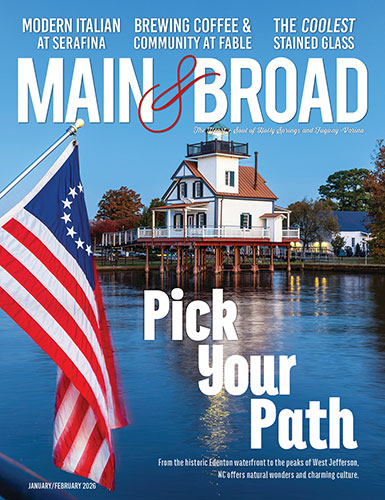Juliann Zoetmulder is a self-proclaimed “one of those parents.”
She writes letters to request her kids’ sports teams offer healthy snacks instead of sugary sports drinks, and you won’t find any Goldfish crackers in her cabinets. Instead they’re filled with homemade and locally grown goods.
The founder and president of Western Wake Farmers’ Market, Zoetmulder doesn’t want to come off as preachy or pretentious. She just strongly believes nutritious food is the key to vitality, and wants to extend the benefits of health-packed local foods to the community — especially children.
She hasn’t always been a health nut, though. “I didn’t eat a tomato until I was like 30 years old,” she confessed. As her children grew, she started considering the consequences of the frozen chicken nugget lifestyle they were growing into, and she didn’t like it. “My kids were asking for candy all the time, and I thought I should be feeding them better.”
Pregnant with her third child, who is now 5, she read Omnivore’s Dilemma. The book, which chronicles alarming facts about food production in the U.S., inspired her to test the difference between locally grown foods and grocery store items shipped in from thousands of miles away. She traveled to the Durham and Carrboro farmers markets — the nearest growers-only markets to her home — and fell in love with the flavors she found.
With three kids, she couldn’t trek back and forth to faraway farmers markets each week. But with her newfound emphasis on raising her children with wide palates and nutrition know-how, she couldn’t go back.
“I wasn’t content with the state of foods in Cary, so I decided, I’m not going to complain about it … I’ll just start a market,” she said. So she gathered some like-minded moms and dove in.
The process wasn’t easy. From selecting a location to securing insurance to signing on farmers, Zoetmulder and the others struggled past roadblocks to turn their mission into reality.
In 2009, the outdoor market opened for business on Saturdays in Carpenter Village. Since then, it has expanded to welcome about 800 customers each Saturday during prime season, along with adding a smaller mid-week market on Tuesday afternoons from May through August. Zoetmulder anticipates about two more years at the current location before the market will need to move elsewhere for logistical reasons.
“A farmers market is not a profitable entity,” Zoetmulder said. “We’re begging farmers to come from other counties, because in Wake County there aren’t a lot of farms left here.”
Keeping the market alive isn’t just a struggle for its organizers. “We’ve had farmers who said they can’t pay the $25 application fee until the first day of sales,” Zoetmulder said. “The food may be a little pricier, but this is what it costs to grow food the way it should be grown.”
“We don’t want people to think local food is just for the affluent,” she said. So beginning this year, all vendors are required to accept EBT funds. Future location considerations include proximity to bus routes and other ways to open up participation to the entire community.
Zoetmulder understands food costs can be an obstacle for wealthier families, too. “Cary seems to be affluent, but there are a lot of people living in big houses with big debts, and a lot of people don’t have money for food,” she said. Though there isn’t a quick solution to that problem, she encourages families to integrate local products to whatever extent they can afford.
Local eating is not an all-or-nothing affair. “At first you look at those people and think, ‘I would never do that,’” Zoetmulder said. “But you take a step, then another step, then another step, and then you’re making your own condiments.”
Finding a balance between helping to educate people and being overbearing can be difficult, she says. Each week at the Western Wake Farmers’ Market she encourages customers to talk with individual farmers to learn more about North Carolina growing schedules and how their food is produced. She has initiated programs at her children’s school, Sterling Montessori, to encourage young kids to embrace new healthy foods.
As evidenced by her letters to soccer coaches at the beginning of each season, Zoetmulder isn’t afraid to vocalize her opinion when it comes to her own family. “You stand up for so many other things for your children in terms of what they should and shouldn’t do,” she said. “We don’t want them to be hurt, and yet they are being hurt every day by some of the foods that they are eating.”
As a family the Zoetmulders enjoy tennis and other outdoor activities such as hiking, now that all children — Alex, 10, Charlie, 7, and Kate, 5 — are old enough to participate. Every two years they vacation to Europe to visit the family of her husband, Eric, who hails from the Netherlands.
In their Cary home, Zoetmulder tries to make as much of her family’s food as possible, “even if it’s just an almond butter sandwich,” she said. She refuses to make the “bland kid food” that she once cooked for her oldest son. Her children seem happy and healthy with their lifestyle, agreeing to the family rule that new foods must be sampled at least 14 times.
Their mother’s teachings seem to stick, too — “Whenever they hear a McDonald’s commercial, they go ‘booo,’” she noted with a laugh.






